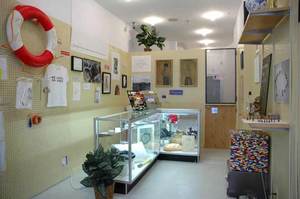This is an archive of the ArtCat Zine, 2007-2009. Please visit our new project, IDIOM.
Thirty days into e-flux's PAWNSHOP

Photo courtesy of e-flux.com
PAWNSHOP
e-flux - 55 Ludlow street, New York NY
1 October 2007 through early 2008
Last month e-flux's Ludlow street location was transformed into a pawnshop as exhibition space, a new project by artists Liz Linden, Julieta Aranda, and Anton Vidokle. For the transformation, some sixty contemporary artists were solicited to contribute works to be pawned — that is, exchanged for a cash value, and kept for 30 days before being offered for sale — which tomorrow become available for purchase to patrons of the pawnshop. The artists who have contributed works include both senior and mid-career artists, some with active collector bases, so much of the works currently on view could well be removed from the space if collectors descend upon the location as it becomes a commercial art distrubution venue. The location has also been aesthetically transformed into one vision of a contemporary American pawnshop, outfitted with pegboard walls, a conventional retail window display, florescent-lit display cases, and an awning that eschews any indication of a commercial or institutional exhibition space.
This functional aesthetic framework does more than recycle an economic model of money lending, barter, and exchange, but also creates the potential for turning unsuspecting patrons into art spectators as they casually wander in to browse the wares. Herein lies the strength of the exhibition, which is complemented further by e-flux's quiet LES location. The historical and critical precedents for this type of relational work are abundant. Nicolas Bourriaud used the model of the flea market to describe a certain strain of 90s art practice in Postproduction. What Bourriaud fails to mention in his text, however, are the artists who set up shop years prior, like Martha Rosler. Rosler provides perhaps the clearest historical prototype to PAWNSHOP with the garage sales she organized in contemporary art spaces in the 70s and later reproduced in the 80s. While Rosler advertised her garage sales both in local general-interest publications and specialized art journals, e-flux's PAWNSHOP lies in wait for unsolicited patrons to enter and engage with the staff on hand, negotiating the established commercial protocol of the pawnshop and the art object. This human element, PAWNSHOP's staff, animates the exhibition and playfully vulgarizes, or, one might even suggest democratizes, the often stiff and financially exclusive world of contemporary art collecting with the contextual application of a well-established and populist economic form.
ZINE
HOME
TIPS / COMMENTS
CATEGORIES
CONTRIBUTORS
- Greg Afinogenov
- B. Blagojevic
- Adda Birnir
- Susannah Edelbaum
- Julie Fishkin
- Paddy Johnson
- Jessica Loudis
- Christopher Reiger
- Andrew Robinson
- Peter J. Russo
- Blythe Sheldon
- S.C.Squibb
- Hrag Vartanian
